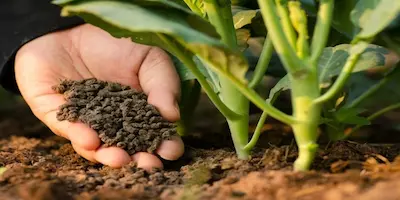Is There a Best Organic Fertilizer for Your Vegetable Garden Based on Canadian Region?

Successfully growing a variety of different vegetables in your garden will depend on the location of your garden, your soil, and the fertilizer you use to nourish your plants. Since nutrients within soil might be slightly different based on where you live, it makes sense that choosing the right fertilizer depends on what’s already in your soil. So based on where you live there may be an organic fertilizer that works best for your garden.
While different regions of the country tend to have different types of soil based on the climate in that area, soil types can also vary within a region. This means that rather than focusing on climate, to get the best results from your fertilizer, you should focus on the type of soil you’re planting in and the type of vegetable you’re growing.
In this article, we’ll give you an overview of how to test your soil and walk you through how to choose the best fertilizers for your plants.
Start with a Soil Test
Before choosing a fertilizer, you need to determine your soil type: loamy, clay, or sandy. Knowing this will allow you to pick the fertilizer that is most likely to help vegetables flourish in your garden.
Luckily, there are four easy steps you can follow to learn more about your soil type.
-
Squeeze it.
Take a handful of moist soil from your garden and squeeze it. Then open your hand and observe what happens:
- If it holds its shape and crumbles when you poke it, you have loamy soil.
- If it holds its shape and does nothing when you poke it, you have clay soil.
- If it falls apart right away, you have sandy soil.
-
Test the Drainage
It’s important to know how well your soil drains. Some plants will die if their roots are always wet. To test your soil’s drainage, you can perform a percolation test:
- Dig a hole that is about 15cm wide and 30cm deep.
- Fill it with water and let it drain. Fill it with water again.
- Observe how long it takes the water to drain.
If it takes your water more than four hours to drain, this means you have poor drainage.
-
Test the Overall Health
If your soil is healthy, chances are you have earthworms in the soil. Here’s how to find out for sure if you do:
- Start with moist soil that’s at least 12 degrees Celsius.
- Dig a 30cm by 30cm hole and put the soil on a tarp or other surface.
- Sift through the soil and count the number of earthworms you see.
Finding less than 10 worms in this amount of soil means it may be too acidic or alkaline or may need more organic matter. Finding more than 10 worms means your soil is healthy.
-
Check the pH
The pH is the acidity level of your soil. On a scale of zero to 14 (from acidic to alkaline), a reading of between six and seven is ideal for most plants to grow. If the pH is lower than five or higher than eight, plants won’t grow as well.
The easiest way to find out the pH of your soil is to pick up a home testing kit from your local garden centre. If you follow the instructions carefully, you should get an accurate result. Once you know if there is a problem with your soil, you can start taking any necessary steps to correct it.
If you prefer to enlist help with testing your soil, you can always hire a professional to test it for you.
Types of Vegetables
When you’re choosing a fertilizer for your garden, you should also consider the needs of the vegetables you’re growing. In our recent article, “Low Maintenance Vegetables to Grow in Your Canadian Garden,” (link to the article) we recommend four of the easiest vegetables for new gardeners to grow successfully in northern climates.
To give you an idea of how different vegetables can have different needs, here are the best fertilizers for our four recommended vegetables:
Green Beans
Green beans don't require much fertilization. Use a fertilizer such as 10-20-10 and mix a light dose into the top 5-7cm of soil on the day you plant your seeds.
Radishes
Radishes need an all-purpose fertilizer mixed into the soil before planting. The best ratio for these plants is 16-20-0, but a balanced 10-10-10 fertilizer will also work.
Lettuce
Lettuce plants need a balanced fertilizer added every two weeks. Use a 10-10-10 or 5-5-5 diluted to half strength.
Peas
Peas can be fertilized once during their growing cycle (when the seedlings first emerge from the ground) with an all-purpose liquid fertilizer.
Professional Gardening Assistance
Planting and caring for a vegetable garden is an exciting step for homeowners. If you’re worried you don’t have adequate time or knowledge to properly maintain it, there is help available. The Grounds Guys offer reliable and trustworthy landscaping services that can help your garden and the rest of your yard flourish.
 Click to call
Click to call


